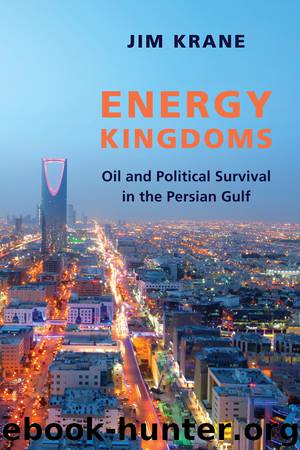Energy Kingdoms by Jim Krane

Author:Jim Krane
Language: eng
Format: epub
Publisher: Columbia University Press
ERRING ON THE SIDE OF CAUTION
In their willingness to snatch back long-held social benefits Dubai and Iran were in the vanguard. Their situations were acute. Dubai’s ruling family was teetering close to financial default. Iran had boxed itself into a corner from which there was no other way out. The rest of the Gulf found itself in similar, albeit less urgent, circumstances. Might these countries, too, break the social compact and retract benefits? Answering that question depended on what citizens were willing to accept.
I decided to find out. In 2011, I worked with the polling firm YouGov to conduct a public survey in all six Gulf monarchies. We polled 730 Gulf nationals on the subject of electricity pricing and willingness to pay full cost. My results suggested that citizens don’t feel as reflexively entitled to subsidized energy or as adamantly opposed to paying higher prices as academics or regional elites think. I concluded that the successful subsidy reforms that took place in Iran and Dubai could indeed be replicated.43
Nearly half of survey respondents (49 percent) did not oppose paying the full cost of electricity when they were informed that the national interest depended on them paying more and using less. By contrast, 32 percent did oppose higher prices. (The rest had no opinion.) When asked how they felt about an Iran-style deal that traded an alternate benefit for giving up electricity subsidy, 51 percent either supported or did not oppose the idea.
Further, only a minority of citizens, albeit a significant minority—42 percent of respondents—maintained that they were entitled to subsidized electricity, as academic theory holds.44 This suggests that the academic understanding of the social contract may be off base. The results weren’t categorical. A significant minority of around a third of respondents remained opposed to higher prices no matter how I phrased the question. For Gulf citizens, then, the door to subsidy reform was partly open.
In a second survey, I asked energy experts, policy makers, and academics about the prospects for subsidy reform. I selected all participants—seventy-six in total—because their expertise included knowledge of Gulf energy issues. This survey produced entirely different results. For the experts, the door to reform was all but closed. Their responses showed that they had done their homework—by reading the scholarly literature. Experts expected citizens to be overwhelmingly opposed to higher prices, and 80 percent of experts (61 of 76) agreed that citizens consider subsidies as “rights of citizenship,” backing up the academic claims.45
These two surveys point to a chasm in the perceptions of the autocratic social contract in the Gulf. Citizens’ feelings about their own energy benefits diverged starkly from the understanding of experts and the literature. Elites held a conservative view that citizens expected the state to provide subsidized energy because it was their birthright (or the government’s duty) to do so. Citizens held more flexible views. Some expected free energy. Others were OK with paying the full cost, if doing so was good for the country.
For policy makers, this finding suggested that what happened in Iran and Dubai might be duplicated.
Download
This site does not store any files on its server. We only index and link to content provided by other sites. Please contact the content providers to delete copyright contents if any and email us, we'll remove relevant links or contents immediately.
The Secret History by Donna Tartt(16623)
The Social Justice Warrior Handbook by Lisa De Pasquale(11489)
Thirteen Reasons Why by Jay Asher(7788)
This Is How You Lose Her by Junot Diaz(5772)
Weapons of Math Destruction by Cathy O'Neil(5037)
Zero to One by Peter Thiel(4824)
The Myth of the Strong Leader by Archie Brown(4789)
Promise Me, Dad by Joe Biden(4447)
Beartown by Fredrik Backman(4419)
Stone's Rules by Roger Stone(4415)
How Democracies Die by Steven Levitsky & Daniel Ziblatt(4399)
The Fire Next Time by James Baldwin(4343)
100 Deadly Skills by Clint Emerson(4079)
A Higher Loyalty: Truth, Lies, and Leadership by James Comey(4033)
Rise and Kill First by Ronen Bergman(4012)
The David Icke Guide to the Global Conspiracy (and how to end it) by David Icke(3882)
The Farm by Tom Rob Smith(3872)
Secrecy World by Jake Bernstein(3782)
The Doomsday Machine by Daniel Ellsberg(3731)
